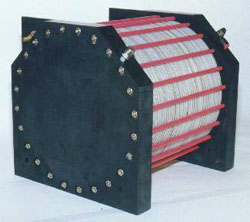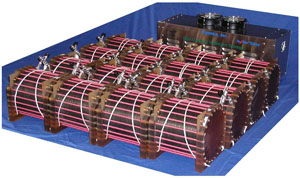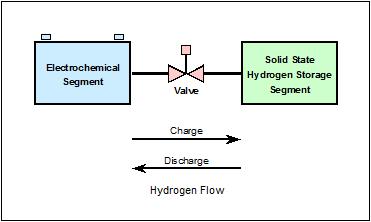Hy-Stor® Segmented Battery
Combines high cycle satellite battery technology
with high density hydrogen storage in metal hydrides
|
This 75 Volt, 1.2 kWh bipolar battery module forms the building block for Hybrid Electric bus and truck batteries. |
 |
|
The Hy-Stor® Segmented Battery is a rechargeable battery being developed for hybrid electric vehicle energy storage. It combines the remarkable energy storage capability of metal hydride alloys with the extraordinary cycle life and discharge rate capabilities of nickel-hydrogen cells. The Hy- Stor battery offers performance, economic and safety advantages that are superior to all other battery technologies. Equally important for hybrid electric vehicles is Ergenics' patented "bipolar" cell configuration. In a bipolar battery, individual cells are placed next to one another in a "stack" assembly with a conductive plate located between each cell. Electrical current passes from one cell to the next across the entire electrode area, enabling operation at high rates of power. |
|
 |
Sixteen Modules and a Solid State Hydrogen Storage Unit form a 20 kWh battery. |
The combination of nickel hydrogen electrochemistry, low pressure hydride energy storage and bipolar construction produces a hybrid electric vehicle (HEV) battery offering extraordinary benefits:

The Electrochemistry of a Powerful Technology
Ergenics' Hy-StorÒ battery makes use of low pressure nickel-hydrogen battery electrochemistry. During charge, hydrogen is produced in the Electrochemical Segment and flows to the Solid State Hydrogen Storage Segment where it is safely stored in a metal hydride alloy at low pressure and in solid form. Hydrogen can actually be stored at two to three times higher energy density in an ambient temperature hydride alloy than as compressed gas. Upon discharge, hydrogen is released from the alloy in the Storage Segment and flows to the Electrochemical Segment to produce electrical power. A valve, located between the segments, eliminates self-discharge, isolating the reactants from one another when the battery is in the charged state. For electric vehicles, the valve can automatically close in the event of an accident to immediately turn the battery off, enhancing safety.

Compared to a conventional nickel-metal hydride battery, the Hy-Stor Segmented Battery possesses a clear advantage in cycle life and rate performance. Increased cycle life comes from the separation of the electrochemical segment from the hydrogen storage segment. The hydride alloy is not immersed in corrosive electrolyte, resulting in indefinite alloy life. Also, the alloy does not have to conduct electricity, so there is no need to bond the particles. In a typical nickel-metal hydride battery, the same alloy not only has to store hydrogen, but it also serves as the negative electrode, having to conduct the electrochemical redox reactions. This dual function of the alloy requires a compromise, since its surface cannot be tailored for optimum electrochemical performance.

